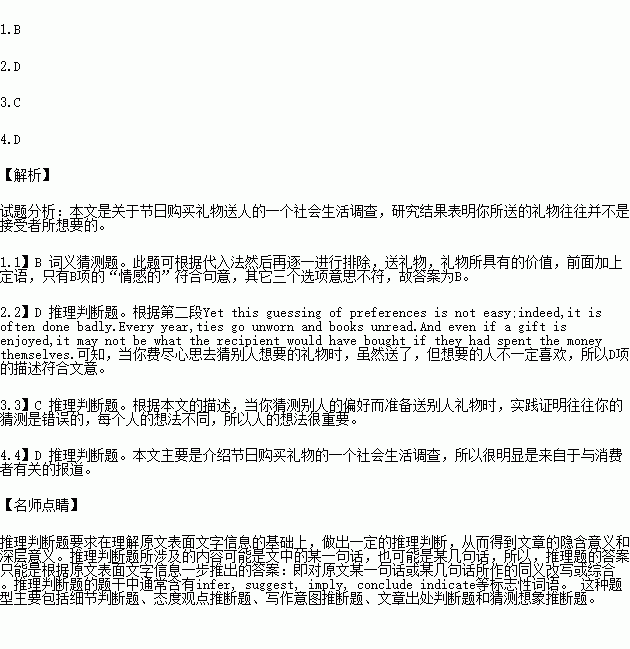题目内容
Is any economist so dull as to criticise Christmas? At first glance,the holiday season in western economies seems a treat for those concerned with such vagaries (奇想)as GDP growth.After all,everyone is spending;in America,retailers make 25% of their yearly sales and 60% of their profits between Thanksgiving and Christmas.Even so,economiwsts find something to worry about in the nature of the purchases being made.
Much of the holiday spending is on gifts for others.At the simplest level,giving gifts involves the giver thinking of something that the recipient would like-he tries to guess her preferences,as economists say-and then buying the gift and delivering it.Yet this guessing of preferences is not easy;indeed,it is often done badly.Every year,ties go unworn and books unread.And even if a gift is enjoyed,it may not be what the recipient would have bought if they had spent the money themselves.
Interested in this mismatch between wants and gifts,in 1993 Joel Waldfogel,then an economist at Yale University,sought to estimate the difference in dollar terms.In a research,he asked students two questions at the end of a holiday season:first,estimate the total amount paid (by the givers) for all the holiday gifts you received;second,apart from the sentimental value of the items,if you did not have them,how much would you be willing to pay to get them? His results were gloomy:on average,a gift was valued by the recipient well below the price paid by the giver.
In addition,recipients may not know their own preferences very well.Some of the best gifts,after all,are unexpected items that you would never have thought of buying,but which turn out to be especially well picked.And preference can change.So by giving a jazz CD,for example,the giver may be encouraging the recipient to enjoy something that was ignored before.This,a desire to build skills,is possibly the hope held by many parents who ignore their children's desires for video games and buy them books instead.
Finally,there are items that a recipient would like to receive but not purchase.If someone else buys them,however,they can be enjoyed guilt-free.This might explain the high volume of chocolate that changes over the holidays.Thus,the lesson for gift-givers is that you should try hard to guess the preference of each person on your list and then choose a gift that will have a high sentimental value.
1.The word “sentimental” in Paragraph 3 is close to “ ”
A.intelligent B.emotional C.social D.practical
2.According to the text,which of the following statements is TRUE?
A.Price is nothing but the factor when you give gifts.
B.Chocolates will be blamed when people receive them as gifts.
C.The receivers often overestimate the values of gifts.
D.Wants do not always correspond to needs in gift-giving.
3.Which of the following statements can be inferred from the text?
A.The gift-giver tries to neglect the actual needs of the receiver.
B.The best gifts are well picked by the givers.
C.In gift-giving,guessing preference is often a failure,so it's the thought that counts.
D.You have to take money into consideration when giving a gift.
4.The text is most likely taken from a .
A.users' handbook B.medical journal
C.travel magazine D.consumer-related report

